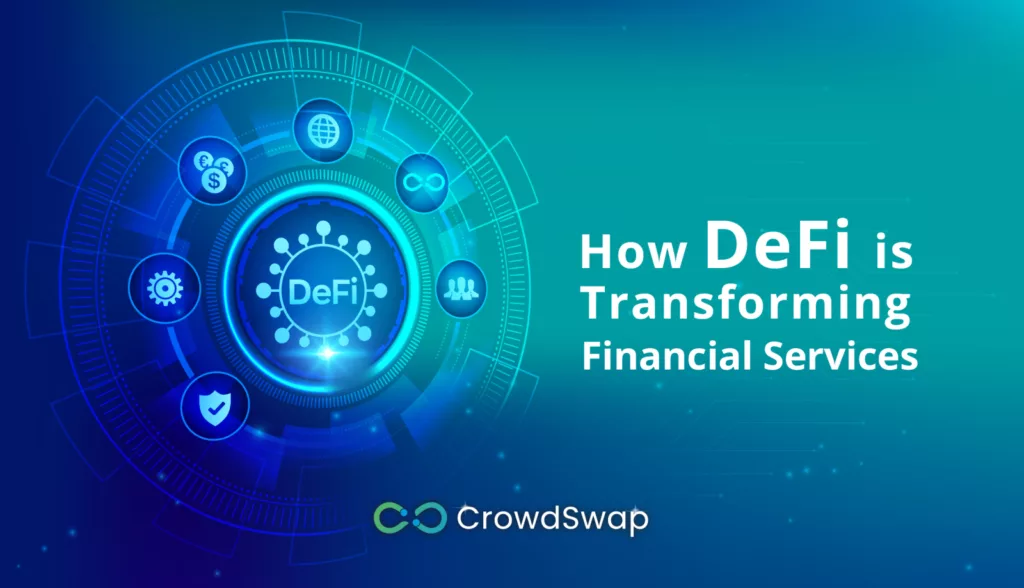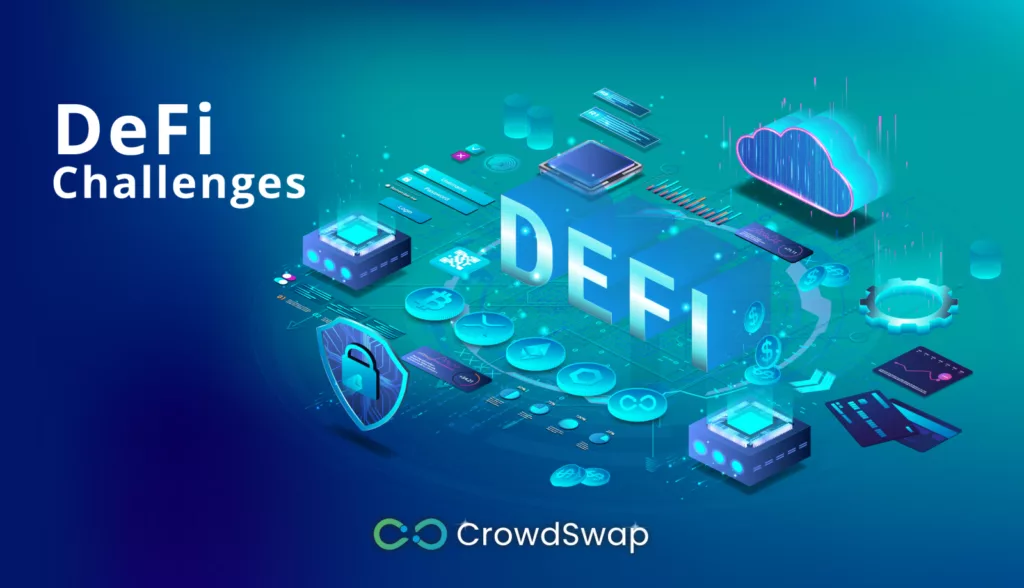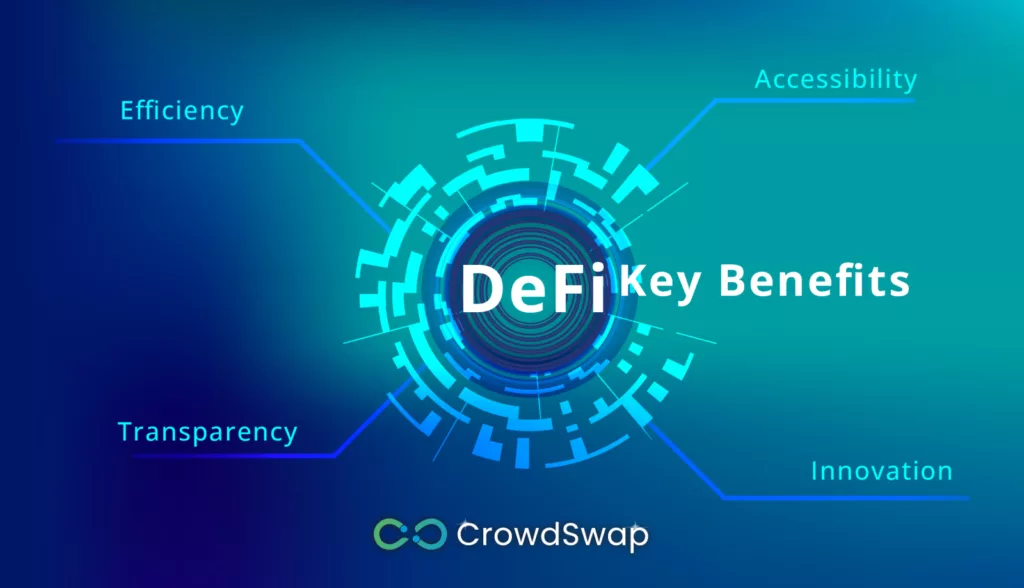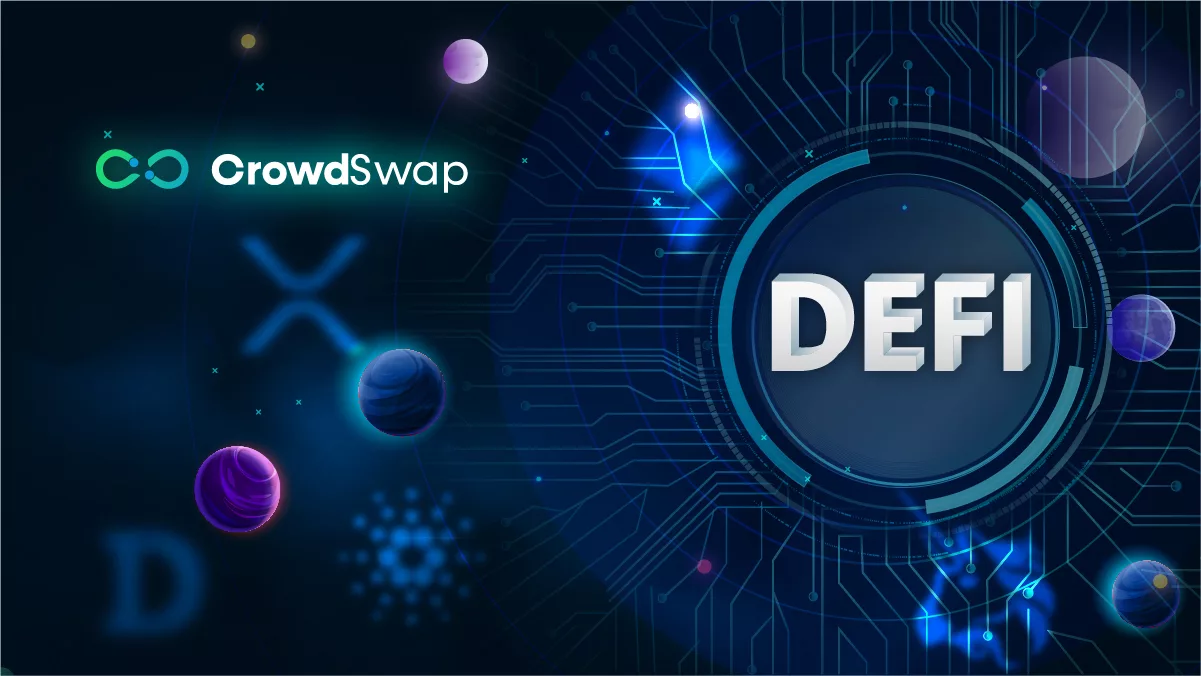Welcome to the exciting world of decentralized finance or DeFi. If you’re new to cryptocurrencies and blockchain technology, you might be asking, “What is DeFi?” You’re not alone! DeFi has become a popular term in the financial world, promising to transform traditional banking and investing.
So, what exactly is DeFi, and why is it causing such a buzz among investors and tech enthusiasts? Join us as we explore the fascinating realm of decentralized finance, offering insights, advice, and trustworthy information.
What is DeFi in Simple Words?
DeFi, or decentralized finance, has garnered significant attention, especially since 2020, amid the ongoing evolution of blockchain technology and cryptocurrencies. In essence, DeFi integrates traditional banking services with decentralized technologies such as the blockchain. This integration, often referred to as Open Finance, aims to revolutionize current financial systems by offering an alternative that eliminates the need for traditional intermediaries like banks.
By leveraging blockchain networks, DeFi introduces a new paradigm in the financial world. These networks empower users with greater control over their funds by eliminating human gatekeepers who can slow down and complicate transactions. This unique aspect of blockchain technology extends its utility beyond simple asset transfers, facilitating various financial applications.
Simply put, DeFi is a system of financial services built on blockchain technology that enables peer-to-peer transactions without traditional intermediaries.
It utilizes smart contracts, which are self-executing agreements, to automate and streamline various financial functions. DeFi platforms are open-source and accessible to anyone with an internet connection, promoting greater financial inclusivity and control over personal assets.
Characterized by transparency, security, and the potential for higher yields, DeFi represents an exciting and transformative frontier in the financial sector.
DeFi vs. Traditional Finance and CeFi
Understanding what is DeFi highlights how it transforms financial services by providing a decentralized, transparent, and inclusive alternative to traditional finance and CeFi (Centralized Finance). Unlike traditional finance and CeFi, which rely on intermediaries like banks and centralized exchanges, DeFi uses blockchain technology and smart contracts to facilitate peer-to-peer transactions.
For more details, read the full article on CrowdSwap’s blog: CeFi vs. DeFi, What is the difference?
How Did DeFi Begin and Revolutionize Global Finance?
Understanding what is DeFi involves looking back to 2015 when MakerDAO launched, pioneering the use of cryptocurrencies as assurance for loans. Often regarded as the bedrock of DeFi, MakerDAO set the stage for a financial revolution by eliminating intermediaries and shifting control to the users of financial services. Building on Bitcoin’s core principle of digital money, DeFi aims to offer a fully digital alternative to Wall Street without the associated fees.
The primary goal of DeFi is to create a more open and fair financial market that anyone can access.
DeFi expands the concept and functionality of money by increasing access to financial services. With just a smartphone and an internet connection, anyone can participate in the DeFi ecosystem, unlocking tremendous potential for the global economy. Analysts consider this one of the most significant advancements in the blockchain and cryptocurrency space.
DeFi has given rise to a thriving crypto-economy where individuals can lend, borrow, invest in long/short positions, earn interest, and more. For instance, crypto-savvy Argentinians have leveraged DeFi to combat their country’s severe inflation. Moreover, companies use DeFi technology to pay their employees in real-time. It’s even possible to take out and repay multimillion-dollar loans through decentralized financial systems, all thanks to the power of blockchain networks.
How Does DeFi Work?
Blockchain technology, the foundation of cryptocurrencies, is also the driving force behind decentralized finance. Understanding how blockchain works can help you grasp the principles of DeFi.
Blockchain is a distributed digital ledger where transactions are stored as blocks and validated by participants. All validators reach a consensus on the validity of transactions, which are then executed. Once a block reaches a certain number of transactions, it is closed, encrypted, and linked to a new block containing information from the preceding block. This chaining of blocks creates the blockchain, ensuring that prior data cannot be altered without affecting subsequent blocks, thus enhancing security.
The blockchain network’s merits introduce one of the most secure, fastest, and most accessible forms of financial services. DeFi addresses many shortcomings of traditional financial systems by eliminating the need to delegate money management to governments or specific businesses or meet particular criteria to access financial services.
Read More: What is Blockchain?
DeFi utilizes smart contracts to meet specific requirements in financial transactions. These self-executing contracts with the terms directly written into code facilitate borrowing, lending, and other financial activities.
Read More: What is a smart contract?

How DeFi is Transforming Financial Services
DeFi replicates many traditional financial services but does so in a fundamentally different way. Here’s how DeFi is transforming the financial landscape:
Lending and Borrowing
DeFi allows users to lend and borrow assets directly from each other, bypassing banks or traditional lenders. Users can earn interest on their deposits or collateral or pay interest on their loans or debts. Notable DeFi lending and borrowing platforms include Aave, Compound, Maker, and Cream.
Trading and Swapping
DeFi enables users to trade and swap assets directly with each other without the need for brokers or traditional exchanges. Users can access various assets, such as cryptocurrencies, stablecoins, tokens, and derivatives. Prominent DeFi trading and swapping platforms include Uniswap, SushiSwap, Curve, Balancer, and CrowdSwap.
Investing and Saving
DeFi provides users with multiple avenues to invest and save their assets, such as staking, farming, and pooling. Users can earn passive income or rewards for providing liquidity or participating in governance. This aspect of DeFi helps users grow their wealth in innovative ways.
Insurance and Protection
DeFi offers solutions for insuring and protecting assets against various risks, such as hacks, bugs, and defaults. Users can buy or sell insurance policies or coverage for their assets or protocols, providing a layer of security previously unavailable in the decentralized space.
The Essential Role of DeFi in Modern Finance
DeFi is pivotal in the evolution of modern finance for several key reasons. One of its most significant benefits is expanding access to money and financial services. With just a smartphone and internet connection, anyone can participate in the DeFi ecosystem, unlocking vast potential for the global economy to extend beyond its current borders.
DeFi democratizes access to financial systems, allowing anyone, regardless of location, to engage with DeFi platforms. The barrier to entry is low, enabling individuals to join the DeFi community in minutes.
Moreover, DeFi applications have the potential to provide financial services to the ‘unbanked’—those who do not have bank accounts or access to traditional financial services. For the first time in history, global financial inclusion is achievable. DeFi offers a revolutionary improvement over the current banking system, which excludes approximately 40% of the world’s population from basic financial services.
In summary, DeFi is not just an innovation in technology but a transformative force in financial inclusion, providing unprecedented access to financial services for individuals worldwide.

DiFi Challenges
Scalability
Many DeFi platforms, especially those on blockchains like Ethereum, encounter scalability issues. High transaction fees and network congestion hinder the efficiency and scalability of DeFi applications. To address this, solutions such as layer two protocols, sharding, and rollups are being developed.
Security
DeFi relies on smart contracts that can have bugs or vulnerabilities, making them targets for hacks. Ensuring security requires thorough auditing, testing, and community verification.
Regulation
DeFi operates largely unregulated, leading to legal and compliance challenges. Different regions have various laws on taxation, anti-money laundering, consumer protection, and securities, which users and developers must be aware of and follow.
Education
The complexity of DeFi demands a high level of technical and financial literacy. Users must understand how DeFi works, its benefits and risks, and how to safeguard their assets and privacy. Developers need to focus on creating secure, scalable, and user-friendly applications.

DeFi Key Benefits
Accessibility
DeFi is open to anyone with an internet connection and a compatible wallet. Users can access services without identity verification, credit checks, or paperwork and participate in global markets with alternative currencies and assets.
Efficiency
DeFi transactions are faster and cheaper due to the absence of intermediaries. Smart contracts automate complex financial logic, reducing human error and delays.
Transparency
Built on public blockchains, DeFi allows anyone to verify transactions and code. Users can see real-time data and the performance of protocols and products, along with associated risks and rewards.
Innovation
DeFi is rapidly evolving, offering a wide range of products and services such as lending, borrowing, trading, investing, and insurance. Users can create their own DeFi applications or join communities to influence the future of finance.
The Future of DeFi
DeFi is still a nascent and evolving space with vast potential and room for growth. Several key trends and developments are likely to shape its future:
Cross-Chain Interoperability
Enabling different blockchain networks to communicate and exchange data and value will create more seamless transactions and collaborations, expanding DeFi’s user base and liquidity.
Layer 2 Solutions
These aim to enhance blockchain scalability and performance by offloading some computations and storage from the main chain, reducing congestion and transaction costs on networks like Ethereum.
Institutional Adoption
Increased participation from traditional financial institutions can bring legitimacy, credibility, and capital to DeFi, fostering innovation and integration between old and new financial systems.
Regulatory Clarity
Establishing clear and consistent rules for DeFi can protect user rights, promote compliance, and ensure accountability, encouraging broader acceptance and stability in the DeFi space.
How to Invest in DeFi
Understanding what is DeFi is crucial before diving into investment. Investing in DeFi can be rewarding yet risky. Here’s a guide to help you get started:
- Get a Wallet: Choose a wallet that supports different tokens. Popular options include MetaMask, Trust Wallet, Ledger, Trezor, and Coinbase Wallet. These wallets store your private keys and enable interaction with blockchain networks. (Learn More: What Is a DeFi Wallet?)
- Acquire Tokens: You can purchase tokens from centralized exchanges or decentralized exchanges like CrowdSwap.
- Explore DeFi Platforms: DeFi offers various products and services, such as lending, borrowing, trading, investing, and insurance. Use aggregators to discover and compare different platforms.
- Conduct Research: Before investing, thoroughly research each DeFi platform and product. Understand how they work and assess the risks and rewards involved.
- Start Small and Diversify: Begin with small investments you can afford to lose. Diversify your portfolio to spread risk and avoid putting all your funds into one investment.
Investing in DeFi involves navigating a rapidly evolving landscape, so stay informed and cautious.
Read More: How to Invest in DeFi
Security Tips for DeFi Users
Use Reputable Wallets: Start by using trusted wallets like MetaMask or Ledger.
Enable Two-Factor Authentication: Add an extra layer of security to your accounts.
Verify URLs: Always check the URL of DeFi platforms to avoid phishing scams.
Keep Private Keys Secure: Never share your private keys or seed phrases.
Update Regularly: Ensure your software and wallet firmware are up to date.
Research Projects: Thoroughly investigate DeFi projects before investing.
Use Auditing Services: Consider platforms that have undergone smart contract audits.
Diversify Investments: Spread your investments to reduce risk exposure.
Read More: 10 Things to Avoid While Using DeFi Services
Trade Effortlessly
Ready to dive deeper? Our crypto exchange is simple and user-friendly, making trading a breeze
Wrap-Up
Decentralized Finance, or DeFi, is transforming how we access and manage our money by offering a more secure and decentralized alternative to traditional financial services. With the total value locked in DeFi protocols now exceeding billions of dollars, DeFi is quickly becoming a significant part of the financial landscape. Although challenges like scalability, security, regulation, and education remain, the potential for global financial inclusion and innovation is immense. As DeFi continues to evolve, it promises to redefine finance, making it more accessible and efficient for everyone.
FAQ
What is DeFi?
DeFi, or decentralized finance, refers to the use of blockchain technology and smart contracts to offer financial services without traditional intermediaries like banks. It includes activities like lending, borrowing, trading, and investing.
How does DeFi differ from traditional finance?
DeFi eliminates intermediaries, reduces costs, and enhances transparency by using blockchain and smart contracts. Traditional finance relies on centralized institutions, whereas DeFi is decentralized and peer-to-peer.
How can I start investing in DeFi?
To invest in DeFi, get a compatible wallet like MetaMask or Ledger, acquire different tokens, explore various DeFi platforms, conduct thorough research, and start with small, diversified investments.













